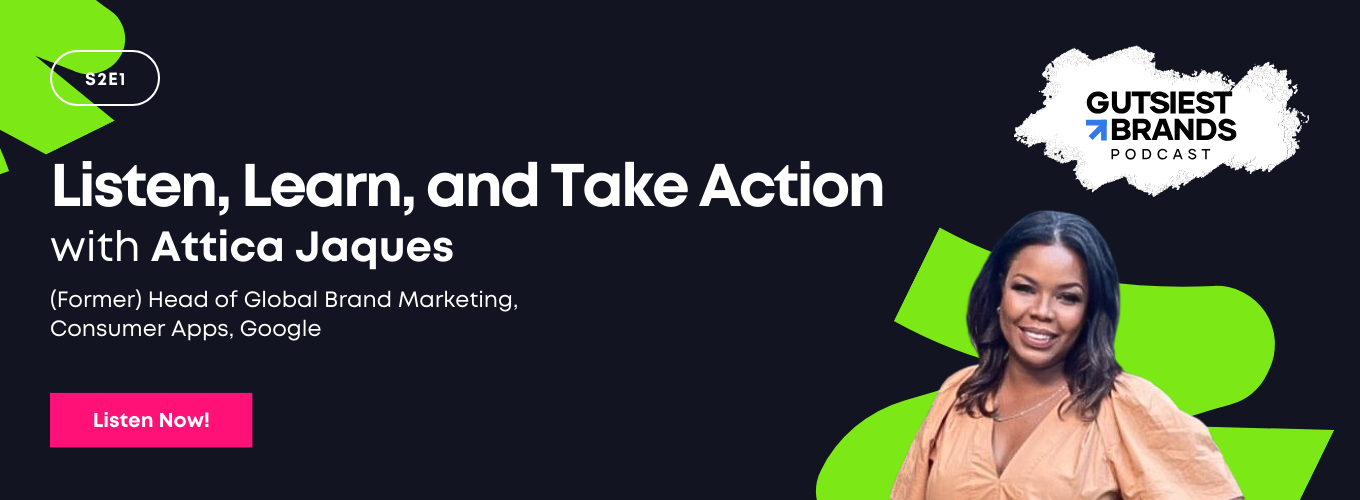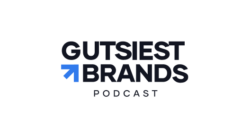We’re thrilled to kick off season two of the Gutsiest Brands podcast with a truly inspiring conversation with Attica Jaques, former Head of Global Brand Marketing for Consumer Apps at Google. In it, she talks about the importance of leading with diverse perspectives, being “human” as a brand, and why she thinks you should be working with people who share your values.
If you think of some of the biggest brands in fashion, sports, and tech, you’d basically have Attica’s resumé. She began her career in luxury fashion, working for both Barney’s and Prada, and then made her way to Gap where she spent ten years working with the international arm of the business. Then, she pursued her passion for sports at Under Armour, before following her heart back home to San Francisco with a position at Google.
In this episode, Attica shares some of the top lessons she has learned along the way:
Takeaway #1 – Follow Your Passions to Learn and Grow
Attica’s resumé is impressive. It’s almost like she got to jot down all of her favorite passions and got to build a career around it. Attica agrees. She has always followed her passions because when you follow a passion, “work feels less like work because you are so embedded in it.” But the benefits of chasing your dreams go beyond that. “I think for me, too, I’ve always wanted this sense of learning something new, and sometimes when you’re able to change different sectors and different passions, you’re able to really learn and grow. And I think that’s always been something that follows me in my career.”
Takeaway #2 – Don’t Just Listen – Take Action
In the midst of the health and racial equity issues that were so top of mind for people in the United States during the pandemic, Google stepped up to the plate and made things easy for consumers to make a big impact. “One of the things that we saw just in businesses is that Black-owned businesses were failing at a rate twice of non-Black-owned businesses. In 2021, forty-one percent of Black-owned businesses by the end of the year had already had to shutter, which was an alarming rate.” But while Black-owned businesses were failing, online searches were going up “by over a thousand percent. So, you kind of put those two things together, and you think about what are the ways in which we can help [and] enable people with information so that they can participate.” Google then made it easier to search specifically for Black-owned businesses and this “had a positive impact on those businesses. It elevated them, they were easier to find. And it had an impact on their bottom line and really the economy ultimately.” All of this comes down to one simple skill: listening. Attica says, “We want to listen, but then we also want to be in a place to take action. So, it’s also what you do with those learnings after you listen to take action that really makes a powerful difference.”
Takeaway #3 – Find People with Your Values
Attica says building a brand “really starts with finding a tribe who have a lot of the same values.” One great example Attica gives is Google’s support for the WNBA. “At Google, we have so many people, men included, that have conviction around gender equity. When we think about the lens of our female athletes on top of that and the rate at which they were making so much less to the dollar, there was another opportunity for us to bring more brand awareness. Rather than most brands that invest in NBA and NBA players, we started with the WNBA first.” The shared conviction for women’s equity between the WNBA and Google made them “a tribe of people who did believe that we could make a difference. And we did.” People in tribes show up for and support each other, even if they only have the faintest connections. “I think we all need that,” Attica says. “Men, women, any kind of identity that you have, we need to have tribes around us, and we also need to be in someone’s tribe.”
Takeaway #4 – Brands Are Human
When Under Armour got called out online by a young girl for just having basketball shoes that are for boys, they didn’t cower in a corner, get defensive, or say sorry and then do nothing. Instead, they brought the girl into their offices and figured out how to remove their massive blind spot. “[Under Armour] had a signature shoe with Stephen Curry, and we also had girls who played basketball that did not see themselves in our product. We had this incredible girl who called us out on it and told us that girls ball, too.” Ultimately, they designed a new shoe just for girls. Attica believes that “brands are like people, and we do make mistakes. We also have relationships with our audience, with our customers, with our users, and they can be incredibly forgiving when we own up to those mistakes and move on with a really clear perspective.” Attica calls this “moving at the speed of culture. It means that you might actually get it wrong sometimes. And it means that you are also learning with your community, with consumers, and with the world. And that does take a lot of guts to actually take action.” Brands are human, too.
Takeaway #5 – Diversity, Equity, Inclusion, & Belonging at Work
Attica is a big believer in bringing everyone to the table. “Most brands, most people, and most allies are starting to recognize when diverse perspectives are missing,” she says, “and are doing a lot more to bring in those perspectives. And I think the biggest opportunity that we have is to not stop. Especially now, with so much happening in the world from a macro standpoint, [it] can kind of fall at a place where it becomes less important.” While DEIB has been a hot topic, it is still underutilized in businesses today, but it can be a powerful force for good in a company when applied correctly. “We just have to ensure that we really do not pump the brakes. That it becomes a part of what we do, that we really build the muscle and continue to be intentional about it.”
Attica’s Best Advice?
“I think the biggest [lesson] was as a leader, as a black woman, realizing that you’re still one perspective. You may have a lot of intersectionality, but you have to bring more people to the table that have a diverse perspective. And honestly, I really recommend to many brands that we have to make those tables bigger because we cannot be the only ones, we cannot represent all underrepresented people. At Google specifically, we have a team that created inclusive marketing consultants, a safe space for people to provide a point of view and to provide intersectional perspectives to ensure that the work is better. And I can’t tell you the amount of times that just being able to listen, give feedback – and honestly difficult feedback – that the work became better almost every time. Make the table bigger. You don’t have to be the one and only if you do identify with an underrepresented group, and we can all win when we do that.”
Keep Learning
Catch up on Attica’s full interview by listening to the Gutsiest Brands podcast. If you are interested in how your brand can uncover the deep customer insights that can enable you to lead with empathy, pioneer new paths, stand behind bold ideas, and lean into “the power of AND,” we’d love to help. Drop us a note!




 Back to Blog
Back to Blog


